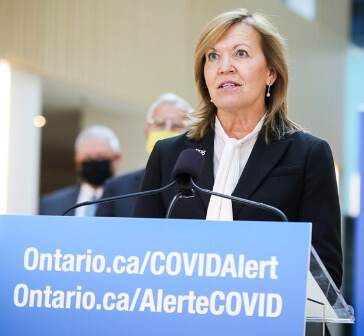Ontario Expands COVID-19 Vaccine Locations
Province prepared to administer additional vaccines in the coming weeks
The Voice of Canada News: Ontario will be distributing additional doses of the Pfizer vaccine to 17 more hospital sites over the next two weeks, including regions with the highest rates of COVID-19 infection. This is part of the initial phase of the government’s three-phase vaccine implementation plan that began on December 14 with the initial vaccinations administered at Toronto’s University Health Network (UHN), followed by the launch of the pilot project at UHN and The Ottawa Hospital on December 15.
Ontario is expecting to receive up to 90,000 Pfizer-BioNTech doses from the federal government before the end of the year to continue vaccinating health care workers and essential caregivers who work in hospitals, long-term care homes, retirement homes and other congregate settings caring for seniors. To prepare for the rollout of these next shipments, the following 17 hospital sites will be receiving the vaccine in addition to UHN and The Ottawa Hospital:
- Windsor Regional Hospital
- London Health Sciences Centre
- Grand River Hospital
- Halton Healthcare
- Hamilton Health Sciences
- William Osler Health System
- Trillium Health Partners
- Southlake Regional Health Centre
- Mackenzie Health
- Humber River Hospital
- Sunnybrook Health Sciences Centre
- Toronto East Health Network
- Unity Health Toronto
- Scarborough Health Network
- Lakeridge Health
- Royal Victoria Regional Health Centre
- Thunder Bay Regional Health Sciences Centre
“Following a successful pilot, we are excited to continue onto the next stage of our rollout of the COVID-19 vaccines to Ontarians,” said Christine Elliott, Deputy Premier and Minister of Health. “While we are planning to ensure that everyone who wants a vaccine will receive one, we need to first protect our frontline workers and those providing essential care to our most vulnerable.”
All of these sites already have the equipment necessary to safely store the Pfizer vaccine at -70 degrees and the required staff are ready to receive and administer vaccines. Since this vaccine cannot be transferred beyond the initial delivery location at this time, vaccinations will continue to be administered to health care workers in high-risk settings first, such as long-term care homes and hospitals. Thunder Bay Regional Health Sciences Centre was selected to test the travel logistics in Northern Ontario and support the administration of the vaccine to Indigenous and remote communities.
To date, as part of the pilot project, Toronto’s UHN and The Ottawa Hospital have administered over 2,300 doses and will continue to aim to vaccinate over 2,500 health care workers providing care in hospitals and long-term care homes.
“Our guiding priority is to ensure frontline health care workers and vulnerable populations receive the vaccine in this initial phase to ensure they are protected,” noted Solicitor General Sylvia Jones. “As the supply of available dosages increases and is delivered to Ontario, we will be prepared to provide the vaccine in communities across the province.”
As Phase One progresses, Ontario will continue to monitor the logistics of delivery, reconstitution of the vaccine, clinic management, and post-vaccine surveillance to help inform the province’s preparedness plan to receive larger vaccine quantities.
During this phase, Ontario is expecting to receive doses of the Moderna vaccine once approved by Health Canada, which will allow vaccines to be administered onsite at long-term care homes in lockdown areas, followed by retirement homes, other congregate care settings for seniors, and remote Indigenous communities.
In early 2021, additional hospital sites across the province will be administering the Pfizer vaccine to health care workers, as well as essential caregivers, and long-term care home and retirement home residents.
“This expanded distribution list is fantastic news and allows us to continue to test and refine our vaccination rollout plan,” said General Rick Hillier. “This is the next important step that gets us ready for all of Ontario in 2021.”
As the province is rolling out its phased vaccination program and heading into holiday season, it remains critically important that all Ontarians continue following public health advice to protect our communities and most vulnerable populations, and to stop the spread of COVID-19.
QUICK FACTS
- The province’s decision to identify key populations to receive the vaccine first is based on the advice of medical experts and ethicists, and recommended by the COVID-19 Vaccine Distribution Task Force and aligned with the National Advisory Committee on Immunization’s recommendations.
- On December 9, 2020, Health Canada authorized the first COVID-19 vaccine in Canada, manufactured by Pfizer-BioNTech. Health Canada authorized the vaccine after an independent and thorough scientific review for safety, effectiveness and quality. Health Canada will continue to monitor the safety and effectiveness of the vaccine.
- The province will shift to Phase Two of its vaccination implementation plan, which is expected to begin later in the winter of 2021, when more vaccines become available to Ontario. During Phase Two, vaccinations will be administered to health care workers, as well as to residents in long-term care homes, retirement homes, home care patients with chronic conditions and additional First Nation communities and urban Indigenous populations, including Métis and Inuit individuals.
- Ontario will enter Phase Three when vaccines are more widely available for everyone who wishes to be immunized. While vaccines will not be mandated, people will be strongly encouraged to get vaccinated during this phase.
- To help everyone stay safe, download the COVID Alert app. It is free to use and is available from the Apple and Google Play app stores. This app lets users know if they may have been exposed to the virus.








